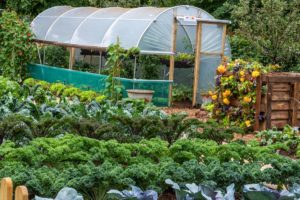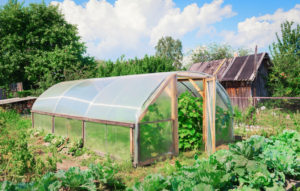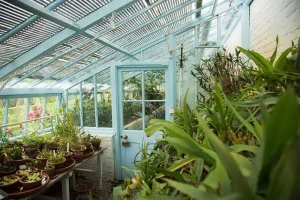Growing your own food can be a life-changing experience, offering numerous benefits that go beyond simply providing sustenance.
As an off-grid farmer, I have experienced firsthand the joy of watching my crops flourish, the satisfaction of eating freshly picked produce, and the pride of knowing exactly where my food comes from.
In this piece, I will share my personal insights on the benefits of growing your own food, highlighting everything from the financial advantages to the environmental gains, as well as the improved physical and mental health that can result from this rewarding endeavor.
Whether you have a small backyard garden or a sprawling rural homestead, I hope to inspire you to embrace the joys of self-sufficient living and experience the transformative power of growing your own food.
Freshness and taste
Homegrown produce is typically picked at the peak of freshness and ripeness, which means it tastes better and has more nutrients than store-bought produce.
When you grow your own produce, you can pick it at the peak of freshness and ripeness, ensuring that it is not only more flavorful but also packed with more nutrients.
This is in contrast to store-bought produce, which may have been picked before it was ripe, shipped long distances, and sat on shelves for days or weeks before it is purchased.
As a result, homegrown produce often has a more vibrant taste and a higher nutritional value.
For example, a study by the University of California found that homegrown tomatoes had higher levels of vitamin C and lycopene, an antioxidant that has been linked to reduced risk of certain cancers and heart disease.
Homegrown produce is often free of pesticides and other chemicals used in industrial agriculture, making it a healthier choice for your family.
Overall, off-grid farming is a great way to ensure that your family has access to fresh, healthy, and delicious produce all year round.
Cost savings
Growing your own food can save you money in the long run. While there may be an initial investment in seeds, tools, and equipment, the cost of produce from your own garden can be significantly lower than buying it from a store.
Growing your own food can not only provide you with fresh, healthy produce, but it can also save you money in the long run.
While there may be an initial investment in seeds, tools, and equipment, the cost of produce from your own garden can be significantly lower than buying it from a store.
This is because you can grow your own fruits and vegetables at home, without the added costs of transportation, packaging, and middleman markups that are typically included in store-bought produce.
For example, a study by the National Resources Defense Council found that the cost of growing your own vegetables can be as little as $4.30 per pound, compared to $5.60 per pound for store-bought vegetables.
Off-grid farming methods like permaculture and hydroponics can be highly efficient and self-sufficient, allowing you to grow a wide variety of crops using minimal resources and energy.
By adopting these methods, you can not only save money on your grocery bills, but also live a more sustainable and self-sufficient lifestyle.
Self-sufficiency
Growing your own food allows you to be more self-sufficient and less dependent on the industrial food system. You’ll have more control over what you eat and how it’s grown.
Growing your own food is an empowering way to achieve self-sufficiency and break free from the constraints of the industrial food system.
By cultivating your own fruits, vegetables, and grains, you gain control over what you eat and how it’s grown.
You can choose the specific crops you want to grow, the farming methods you use, and the schedules you keep.
This control allows you to avoid relying on industrial farming practices that may prioritize profit over environmental and social well-being.
By growing your own food, you can also avoid the pitfalls of the global food supply chain, such as transportation emissions, unfair labor practices, and exposure to harmful pesticides.
Instead, you can enjoy fresh, healthy, and sustainably-grown produce right in your own backyard or community garden.
Moreover, off-grid farming offers a unique opportunity to decentralize food production and build resilience in the face of climate change, economic instability, and other systemic challenges.
By growing your own food, you can create a local food system that is more robust, diverse, and adaptable to changing circumstances.
This can involve experimenting with heirloom varieties, using regenerative agriculture techniques, and incorporating animals into your farming practice.
By taking these steps, you can not only improve your own food security but also contribute to the strength and sustainability of your community.
Self-sufficiency through off-grid farming is an increasingly appealing option for those looking to break free from the constraints of the industrial food system.
By growing your own food, you gain control over the quality, freshness, and sustainability of your produce.
Off-grid farming allows you to decentralize food production, building resilience in the face of climate change, economic instability, and other systemic challenges.
By experimenting with heirloom varieties, using regenerative agriculture techniques, and incorporating animals into your farming practice, you can create a local food system that is more robust, diverse, and adaptable to changing circumstances.
Not only does off-grid farming improve your own food security, but it also contributes to the strength and sustainability of your community.
By growing and sharing your own food, you can build relationships with your neighbors and foster a sense of interdependence and mutual aid.
In the process, you may discover hidden talents and untapped resources within your community, leading to a more vibrant and self-reliant society.
Off-grid farming is not just about food production; it’s also a chance to reclaim your time, your health, and your sense of purpose.
By dedicating yourself to the land and to your community, you can recapture a sense of fulfillment and connection that is hard to find in our fast-paced, industrialized world.
So, if you’re looking to take back control of your food system, your health, and your future, consider the power of off-grid farming.
Health benefits
Homegrown produce is often organic and free of harmful chemicals and additives, which can improve your overall health and well-being.
Homegrown produce is not only delicious and convenient, but it also offers numerous health benefits.
By growing your own fruits and vegetables, you can avoid the use of harmful chemicals and additives that are often found in store-bought produce.
These chemicals, such as pesticides and herbicides, can have negative impacts on your health, including respiratory problems, hormone disruption, and even cancer.
In contrast, homegrown produce is often organic and free of these harmful substances, which can improve your overall health and well-being.
Moreover, off-grid farming practices such as permaculture and biodynamic agriculture can promote soil health and biodiversity, which can lead to more nutritious and flavorful produce.
By using natural methods such as composting and polycultures, off-grid farmers can create a more balanced and sustainable ecosystem that benefits both the land and the people who live on it.
Off-grid farming can reduce the carbon footprint of food production, as it often relies on renewable energy sources such as solar and wind power.
By choosing to grow your own produce using off-grid farming methods, you can not only improve your health but also contribute to a more sustainable and environmentally conscious food system.
Whether you have a small backyard garden or a large off-grid farm, the benefits of homegrown produce are clear: fresh, healthy, and sustainable food that nourishes both body and mind.
Community building
Growing your own food can help build a sense of community with your neighbors and fellow gardeners. You may be able to trade or share resources, knowledge, and produce.
Off-grid farming not only provides a self-sufficient source of fresh produce, but it also fosters a sense of community among neighbors and fellow gardeners.
When individuals come together to share resources, knowledge, and produce, they form bonds that transcend mere geography.
Gardening cooperatives and community-supported agriculture (CSA) programs have become increasingly popular, allowing members to pool their resources, share expertise, and reap the rewards of their collective efforts.
These collaborative ventures not only ensure a steady supply of fresh, locally grown produce but also provide opportunities for social interaction, education, and skill-building.
For instance, experienced gardeners can mentor novice growers, sharing tips and techniques for optimal crop yields and pest management.
Communal gardening projects can provide a platform for neighbors to connect, exchange stories, and develop a sense of belonging.
As relationships flourish, off-grid farming can help build stronger, more resilient communities that are better equipped to face the challenges of the modern world.
Therapeutic benefits
Gardening can be a form of therapy, providing physical activity, stress relief, and a sense of accomplishment.
Gardening is an activity that offers numerous therapeutic benefits, making it an ideal hobby for those looking to improve their physical and mental well-being.
Engaging in gardening provides physical activity, which can help to improve cardiovascular health, strengthen muscles, and increase flexibility.
The digging, weeding, and watering involved in gardening can be a form of aerobic exercise, providing a gentle and effective workout for the body.
Gardening can be a stress-relieving activity, allowing individuals to focus their attention on the task at hand and forget about their daily worries.
The sense of accomplishment that comes from nurturing plants from seed to harvest can also boost self-esteem and self-confidence, leaving individuals feeling more positive and fulfilled.
Off-grid farming, in particular, offers a unique opportunity to connect with nature and experience the therapeutic benefits of being in the great outdoors.
By growing their own fruits and vegetables, individuals can take control of their own health and well-being, and experience the satisfaction of producing their own food.
Skill building
Growing your own food requires learning new skills such as soil preparation, planting, irrigation, and pest management. This can lead to personal growth and a sense of accomplishment.
Growing your own food is an excellent way to develop a range of practical skills that can enhance your self-sufficiency and provide a sense of accomplishment.
Soil preparation, for example, requires an understanding of nutrient balance, pH levels, and organic matter content to produce healthy and productive soil.
Planting involves selecting the appropriate varieties, calculating spacing and succession planting, and maintaining a consistent watering schedule.
Irrigation techniques such as drip irrigation and grey water systems can help optimize water use and minimize waste.
And pest management techniques such as integrated pest management (IPM) and crop rotation can help prevent the use of harmful chemicals and maintain the health of your crops.
By mastering these skills, you’ll not only be able to produce a bounty of fresh, nutritious food, but you’ll also gain a deeper understanding of the interconnectedness of ecosystems and the importance of stewardship.
Off-grid farming methods such as permaculture and biodynamic agriculture can also provide unique opportunities for skill building and personal growth by incorporating principles of natural ecology and sustainability.
With the right knowledge and equipment, anyone can start small and gradually scale up their food production capabilities, leading to a more self-sufficient and fulfilling lifestyle.
Connection to nature
Gardening allows you to connect with nature and appreciate the beauty of the natural world. You may also develop a deeper appreciation for the soil, water, and other resources that are required to grow your food.
Gardening offers a unique opportunity to reconnect with nature and appreciate the beauty of the natural world.
By working with the soil, water, and other elements, you develop a deeper understanding of the interconnectedness of all living things.
Off-grid farming takes this connection to nature a step further, as it requires a reliance on natural resources and a harmony with the local ecosystem.
By growing your own food, you are not only providing sustenance for yourself and your family, but you are also helping to preserve the natural balance of the land.
Off-grid farming can be a powerful tool for connecting with nature and appreciating the beauty of the natural world.
Whether you are tending to a small vegetable garden or managing a large-scale orchard, the physical labor and the intimate connection with the land can foster a sense of reverence and respect for the natural world.
The physical act of working the land, nurturing the soil, and watching the crops grow can help you feel more grounded and centered, and can even serve as a form of mindfulness practice.
Moreover, off-grid farming offers a chance to develop a deeper appreciation for the resources required to grow your food.
By relying on natural resources such as sunlight, rainwater, and compost, you begin to understand the interconnectedness of all living things and the importance of preserving the natural balance.
This can lead to a more conscious and responsible use of resources, and can even inspire a more sustainable and self-sufficient lifestyle.
Off-grid farming offers a unique opportunity to connect with nature, appreciate the beauty of the natural world, and develop a deeper appreciation for the resources required to grow your food.
By relying on natural resources and working in harmony with the local ecosystem, you can create a sustainable and self-sufficient lifestyle that benefits both you and the planet.
Gardening, specifically off-grid farming, offers a unique opportunity to connect with nature and develop a deeper appreciation for the resources required to grow your food.
By relying on natural resources such as sunlight, rainwater, and compost, you begin to understand the interconnectedness of all living things and the importance of preserving the natural balance.
This can lead to a more conscious and responsible use of resources, and can even inspire a more sustainable and self-sufficient lifestyle.
Through off-grid farming, you can learn to appreciate the beauty of the natural world and develop a deeper appreciation for the soil, water, and working the land.
Nurturing the soil, and watching the crops grow can help you feel more grounded and centered, and can even serve as a form of mindfulness practice.
By working in harmony with the natural world, you begin to understand the importance of preserving and protecting the land for future generations.
This not only benefits you and your community but also the planet as a whole.
As you work to produce your own food, you can’t help but develop a greater appreciation for the earth and everything it provides.
By producing your own food, you are not only providing for yourself and your family but also taking a step towards sustainability and self-sufficiency.
This way of living can not only reduce your carbon footprint but can also become a way of life that promotes the health of both yourself and the planet.
I hope this elaboration of off-grid farming and its connection to nature has provided you with actionable information.
By taking action and pursuing this form of sustainable living, you are not only providing for yourself and your family but also contributing to the health of the planet and future generations.
I encourage you to explore the connection between off-grid farming and nature and see how you can apply this in your daily life.
Want More? Dive Deeper Here!
Hey there! If you’re the type who loves going down the rabbit hole of information (like we do), you’re in the right spot. We’ve pulled together some cool reads and resources that dive a bit deeper into the stuff we chat about on our site. Whether you’re just killing time or super into the topic, these picks might just be what you’re looking for. Happy reading!





